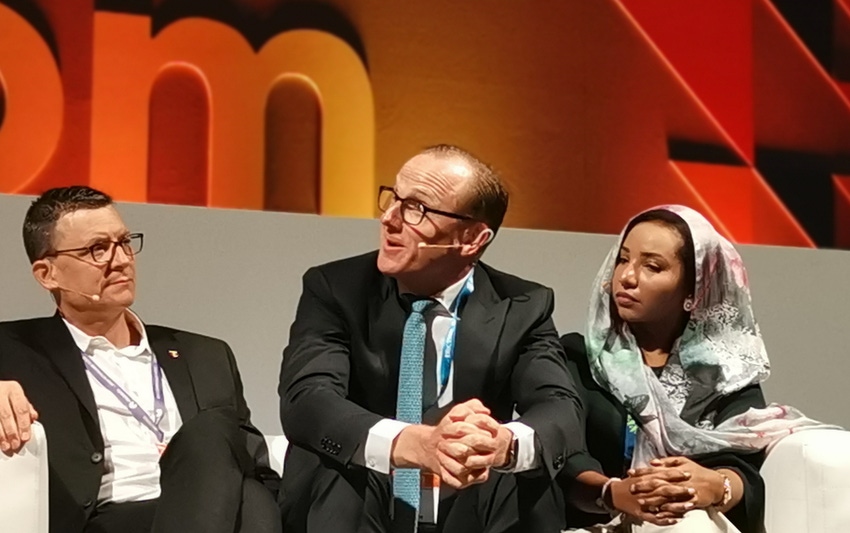It might seem like an unusual statement to make, but if the fortunes of the fourth industrial revolution are going to be realised, telcos need to stop bickering between themselves.
November 13, 2018

It might seem like an unusual statement to make, but if the fortunes of the fourth industrial revolution are going to be realised, telcos need to stop bickering between themselves.
The new competitive landscape seems like a very counter-intuitive one. The status quo for years has been to capture as many subscriptions as possible, building profits on top of connectivity, though the digital economy is so much more. This might seem like a very obvious statement to make, though the dangers are seemingly more apparent on the African continent, with the OTTs and cloud players a larger threat to a telco than other telcos.
This was a fear which emerged during the opening panel sessions at the AfricaCom 2018 show in Cape Town. Connectivity is not enough, especially on a continent where ARPU can be as low as $4 a month. There is of course demand for more data connectivity, but where is the value when you actually deploy data networks? According to Hind Elbashir, Group Chief Strategy Officer at Sudatel, not in the connectivity business.
“The OTTs have spread their wings, while we are continuing to compete in a very small place,” said Elbashir.
While the telcos are laying the foundations for the digital economy in Africa, they are continuing to focus efforts on traditional business models focused around connectivity and subscriptions. This is a limited section of the value chain, becoming increasingly crowded, and built on the race to the bottom. Value will become increasingly difficult to find and profitability will erode as the telcos fight for customers on pricing. However, the fourth industrial revolution is creating value elsewhere in the ecosystem.
Nic Rudnick, CEO of Liquid Telecom, echoed Elbashir’s point. While the African telcos are building the networks and spending all their time on securing more subscriptions, foreign players in Silicon Valley or China are swooping in to collect the more lucrative rewards at the top of the digital value chain. The OTTs are capitalising on the vast expenditures outlaid by the telcos and stealing the new value which is being created through enhanced connectivity.
But why is this more of a risk in Africa than anywhere else? That is a very simple question to answer; Africa does not have anywhere near the same scale or penetration of connectivity infrastructure as in the developed markets, while ARPUs are significantly lower, adding more pressure to the bottom line. With African telcos having to spend more CAPEX to deploy infrastructure to realise the digital economy than European or North American counterparts, while simultaneously collecting smaller tariffs off customers, it cannot afford to lose the added value created in other areas of the ecosystem.
This is a change in the industry’s landscape which has been coming for years, but the telcos seem to be struggling to capitalise on. The rules are shifting with the cloud and OTT players securing the lion’s share of newly created revenues without assuming the risk and vast expenditure of network deployment. Not only will the telcos have to transform culture and operations to reverse this trend, but also create new relationships with competitors.
Elbashir pointed to joint investments in infrastructure to reduce financial exposure and allow telcos to spread CAPEX further. Multiple joint ventures would allow for quicker expansion of network infrastructure, increasing the connectivity footprint of the telcos, but also allow talent to focus on creating strategies and products to capitalise on the created value in the digital ecosystem.
Collaboration is a key word, though we all know how difficult it can be to create. However, telcos should recognise the greatest threat is not from other telcos who are fighting for subscriptions, but the OTTs and cloud players who so easily secure revenues in segments of the ecosystem the telcos are struggling to exploit. The threat from the OTTs is a simple one, but if it is not addressed, growth is going to be impossible.
This is a new market dynamic, and while the OTTs might be a threat to all telcos around the world, it seems to be more pronounced in Africa.
About the Author(s)
You May Also Like








.png?width=300&auto=webp&quality=80&disable=upscale)


_1.jpg?width=300&auto=webp&quality=80&disable=upscale)


.png?width=800&auto=webp&quality=80&disable=upscale)